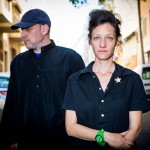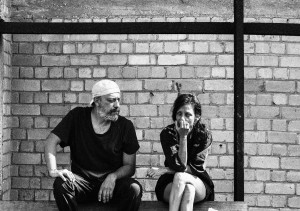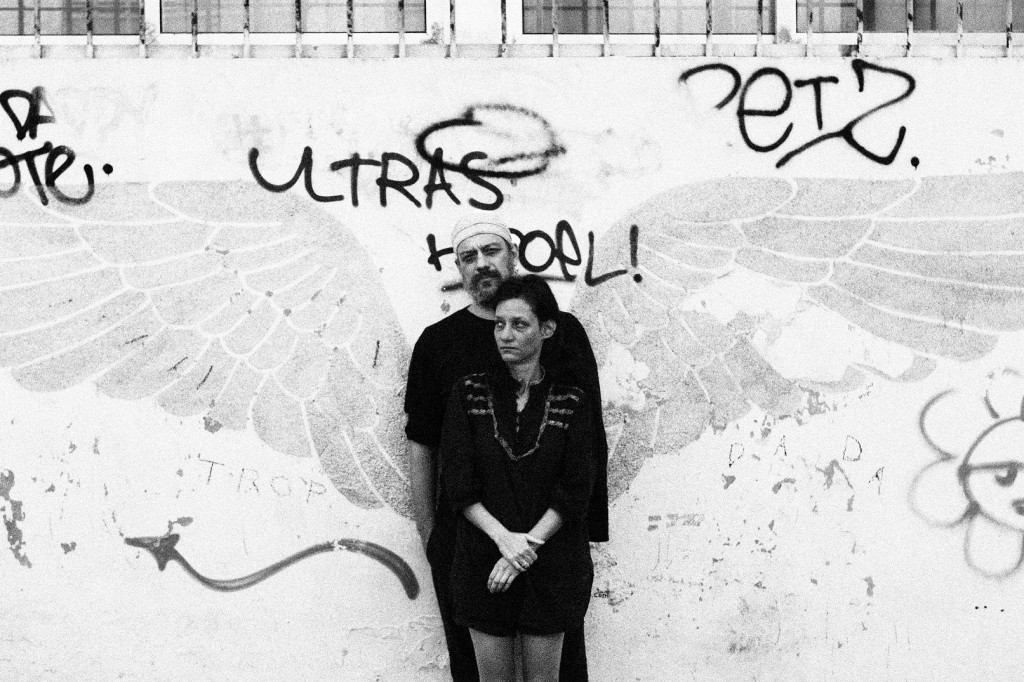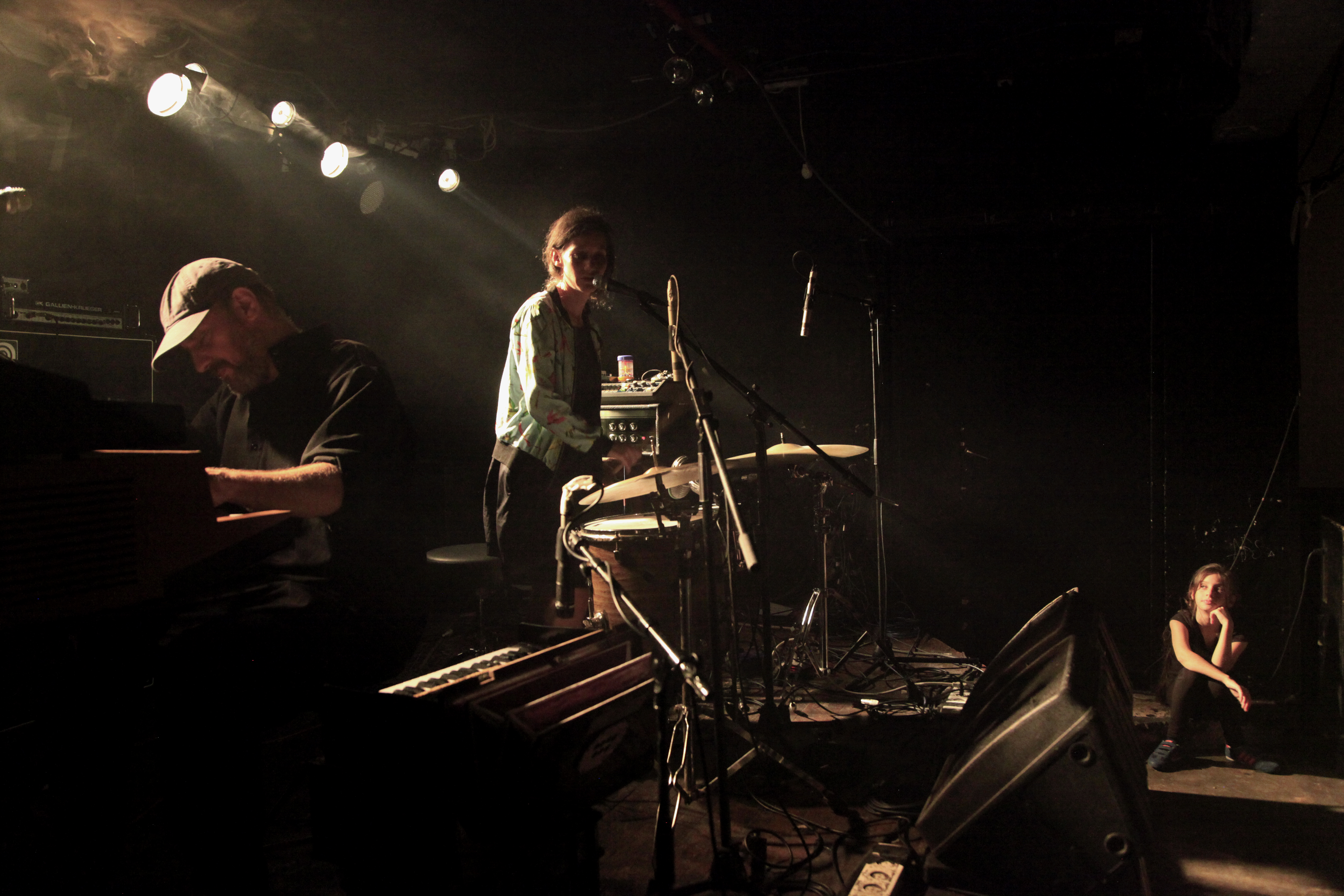 On your website you quote from articles which describe your music as ‘doom swing’,'funeral pop’ or ‘weird wave’ (with some irony, I guess). On your new album, your style is more open and more diverse than ever before. Do you regard such stylistic categories as something to play with, or do you still feel you identify with a certain style or genre?
On your website you quote from articles which describe your music as ‘doom swing’,'funeral pop’ or ‘weird wave’ (with some irony, I guess). On your new album, your style is more open and more diverse than ever before. Do you regard such stylistic categories as something to play with, or do you still feel you identify with a certain style or genre?
These titles were described by Avi Pitchon, an israeli music critique. We liked them and use them, cause they are funny and open enough for interpretations. We actually don’t really know and don’t care of describing our music. I think that our ‘job’ is making the music, others can describe it as they want. On the other hand people need the description and we are happy if there is one (title) that world for us.
Would you say that there were specific reasons why you chose to integrate new elements into your music (I am asking that because the press release speaks of the loss of your equipment because of Hurricane Sandy)?
Yes, our organ got drowned when Sandy Storm hit NYC and our studio in the neighbourhood of Red Hook. The sounds and vividness of New York ‘pushed’ us to buy a synth and an old drum machine. I guess it was the call of nature ![]() , the sound of trap musicians in our building playing night and days, that inspired us.
, the sound of trap musicians in our building playing night and days, that inspired us.
This question is related to the last one. In my review of your new album I wrote that I was reminded to some extent of the 80s because of some of the sounds used. Is my perception correct? If yes, was that a conscious decision or a consequence of the equipment that you had?
I am not sure… I think it might be the instruments that we use and maybe our age. We don’t really listen to music, so it wasn’t a decision or a clear will to sound like music from the 80’s. But yes, this equipment was built from 1977 to 1984, especially the specific reverb we used: a ‘Master Room’ from 1984.
How do you work on new material? Do all of you work together on the lyrics and compositions from the beginning, or does one of you come up with an idea or sketch first?
It’s variated. Often Xavier comes up with a start of a music and then I (Ruth) put a text on it. And then, as we play together, both ingredients shape up together and get into a song. Sometimes the text is just an idea that I play with: I improvise with it until it gets written. Sometimes it’s a text that I wrote a long time ago. There are texts that takes me 10 years to write and some that are written in 2 minutes. Xavier composes the structure of his songs very fast. He likes to use only 3 accords that come up in his mind in a flash and doesn’t try to elaborate it. Afterwards, he works on the mix for several months.
Is there a difference (in the composing/writing process) between a release like “How Does Time”, (which was commissioned for a train), and your “regular” albums?
‘How Does Time’ was thought of and imagined while taking the train itself (and field recording in the train and in the city it went to). It was imagined as a site specific work (even though it could be listened to elsewhere). We also had the restriction of the duration of tracks (respecting the train station). The tracks were played automatically by a GPS point system..
In our albums we are completely free to decide everything, that’s why it takes us much longer to put out a ‘regular’ album.
Can you say a few words about where the idea for the “No World”-release? How often do you find yourselves feeling the “addictive embarrassment that we all experience within the greatest common denominator”?
“No World” is both a CD/book, we put out, a documentary theatre performance (called “No World/FPLL”), and a track in the new album. In those three things we try to communicate with our audience or listeners about this ‘addictive embarrassment that we all experience within the greatest common denominator’. We feel that the world is at a point of what is called post-truth, on the one hand, we already know everything, on the other hand, everything is brought to us on the same platform, and so we have no hierarchy of ideas, and even when we want to ‘fight’ or act against something, we will share a post about it (which, of course doesn’t change anything but our personal moral thinking). In the theatre show we also focused on the Europeen way of this human condition, we spoke about the hypocrisy that is hiding in this era. There is a feeling that France, for example, is a open minded and multicultural when indeed it is as racist, bourgeoise and mizogene as it always was, we tried to set a mirror of our own society. I feel that in this state of things, even tastes, colours and feelings lose their singularity.
You have described your artistic attitude as “a mixture of pessimism and acceptance”. On the other hand, your works often have a critical and somehow angry message. How can a pessimistic sense of reality and accepting things as they are be important for that?
 We see our era as an apocalyptic one, not in a dramatic way, but yes, we feel the end of humans is close, and it’s fine. We can’t safe ourselves from ourselves, we feel that we (the people) came to this situation because of our will, we have the power and the choice to take reality to the point of an end. Not as victims, cause we have a playing role in that choice, we ‘eat what we have cooked’. So the only way for us is to accept it and embrace it, cause it’s still our life, we still have kids to raise and feelings to share, and if this is what we got, we should at least accept it. No need and no way to fight it anymore. We burn into the light, with joy.
We see our era as an apocalyptic one, not in a dramatic way, but yes, we feel the end of humans is close, and it’s fine. We can’t safe ourselves from ourselves, we feel that we (the people) came to this situation because of our will, we have the power and the choice to take reality to the point of an end. Not as victims, cause we have a playing role in that choice, we ‘eat what we have cooked’. So the only way for us is to accept it and embrace it, cause it’s still our life, we still have kids to raise and feelings to share, and if this is what we got, we should at least accept it. No need and no way to fight it anymore. We burn into the light, with joy.
I wonder – in connection with the last question – if the ambiguity that I feel in some songs also has something to do with that. The accepting and friendly relaxation, which contrasts with the dramatic mood in the spoken words in “Golden Sword”, or the subliminal turbulence in the newer “No WorLD”, which only surfaces from time to time… Are these underlying narratives also a method and a statement against suppression?
Probably yes. We are angry, but we’re old and also we simply don’t believe that we can get what we want by our music. So what left for us is to ‘whisper’ our violence.
When it says in your press release that the lyrics “attempt to translate the blindness into which Israeli society is definitely sinking”, would you say that your new album is primarily political or is that just one element of many?
The political situation touches and moves me, it effects the way I see things, and as continuation of it, the way I write. Our songs are no political statements and we are not engaged artists, we just deal with things that are important for us. The Israeli (and Palestinian) societies are one of them.
I recently saw an interview with the American artist Moor Mother in which she was asked whether her music was political and she replied “it should tell the truth of whatever its subject is”. Is that an attitude you can relate to?
Yes. completely.
In the song “Yallah” (which in Arabic means something like “Come on, let’s go”) you sing “This is Jerusalem, city of gold with heart of stone” and in Philippe Petit’s video on it, the city is presented as a pulsating vortex of sensual overflow and contrasted emotions. What experiences led you to draw this picture of the city?
Jerusalem is my city, it’s where I grew up, and I see it in many ways, it’s a very complicated, beautiful and painful place. In one Hebrew song about the western wall there is a line saying ‘there are people with a heart of stone, there are stones with heart of people’, and this gave me the idea. In the clip we also wanted to pass this idea of a place, which is super aggressive but also very vivid. We asked Philippe to shoot this clip, cause we know we can get to a wasted state together and still get the essence of the idea…
There are a lot of video clips to your songs and you have worked with some renowned video artists like the aforementioned Philippe Petit and people like Giovanni Brunetto, Bianca Peruzzi, Eihab Taha. Do you see the video works as an integral part of the releases and of the same importance as the music?
The music takes us longer to make, but we love to meet the right people and let them add images to our sounds. Some people proposed us to work on our songs, and we are happy about it and happy to discover what they did on the music.
To what extent does your music influence your theatre work and vice versa?
The ‘play write’ (the story) of our 1st theatre work was the sound piece we recorded in Jerusalem for ‘Radio France Culture’, the second was also very sound based, so in that sense the dramaturgy writes itself in relation to the sound and the music. Also in theatre venues, we work a lot with the quality and or the non-quality of the sounds, the diffusion, the speakers, how many, where, etc., with the amazing sound engineer Sébastien Tondo.
In the song “Abraham” you re-narrate the Biblical tale of the patriarch and his children in a very condensed form, stressing the fate of the descendants of his sons Israel and Ismael. It seems plausible to understand this as referring to the ongoing conflict between the Jewish Israeli people with their Arab neighbours. Do you think interpreting these conflicts as a war between brothers bears hope for a better mutual understanding?
I don’t know if it bears hope. But even if I don’t have any religious belief or practicees, I do feel that Israeli and Palestinians are closer, if to be dramatic: both sons of the same land (we can still speak about historic rights or the right to return, colonialism…). But I am born as an Israeli in a place that is both and Palestine & Israel.
On your Youtube channel, you document some of your “Take Away Shows” that you did in 2008 in Jerusalem. What was the concept behind these gigs and did they take place at sites with a special symbolism?
 The ‘Take away shows’ were made by Vincent Moon, who suggested to come over to Jerusalem. The places in the city were chosen by us as places that are special and beautiful in our eyes and historically interesting as well. The Tomb of David, The big Wall in the old city, the olive mountain and the nice apartment of our friend Ido Schmitt. We love to play in specific sites, that’s the reason why we sometimes perform in churches, where Xavier plays the pipe organ and I use the microphone and the sound system of the priest on the Altar.
The ‘Take away shows’ were made by Vincent Moon, who suggested to come over to Jerusalem. The places in the city were chosen by us as places that are special and beautiful in our eyes and historically interesting as well. The Tomb of David, The big Wall in the old city, the olive mountain and the nice apartment of our friend Ido Schmitt. We love to play in specific sites, that’s the reason why we sometimes perform in churches, where Xavier plays the pipe organ and I use the microphone and the sound system of the priest on the Altar.
You have played (and lived) in different countries. Do you find that the reception of your work differs from country to country? What have your experiences been so far?
Our work and point of view changes with the places and things we go through, the things we see, the people we meet and the sounds around us. In NYC for example we could play drums in the afternoons in our bedroom, so it changed our way to work and our music. The reception of our concerts is quiet the same everywhere, music is more a question of personal feelings….The theatrical work’s reception is more variated….Hysterical and political in France, more abstract in Germany, emotional in Israel and Poland, etc etc..
You recorded your second album in a church and on a farm. “South From Here” was also recorded in different places. Would you say that the surroundings can influence not only the acoustics of the work but also the way in which something is recorded?
Completely. It’s a lot about the sounds, the reverbs of the spaces, the landscape around, our life inside this landscape, but also the subject this landscape offers us.
Any final words?
FPLL
Yallah, make a revolution !
(M.G. & U.S.)
Photo 1: Shlomi Josef, photos 2 and 3: Noa Ben Shalom, photo 4: Yael Lavram
